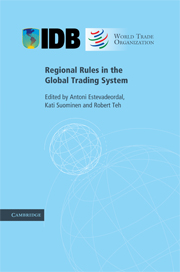Book contents
- Frontmatter
- Contents
- List of figures
- List of tables
- List of Contributors
- Foreword
- Acknowledgements
- List of abbreviations
- 1 Introduction
- 2 Big-Think Regionalism: a critical survey
- 3 Market access provisions in regional trade agreements
- 4 Trade remedy provisions in regional trade agreements
- 5 A mapping of regional rules on technical barriers to trade
- 6 Services liberalization in the new generation of preferential trade agreements: how much further than the GATS?
- 7 Mapping investment provisions in regional trade agreements: towards an international investment regime?
- 8 Competition provisions in regional trade agreements
- Appendix: List of RTAs included in the survey
- Index
4 - Trade remedy provisions in regional trade agreements
Published online by Cambridge University Press: 01 March 2011
- Frontmatter
- Contents
- List of figures
- List of tables
- List of Contributors
- Foreword
- Acknowledgements
- List of abbreviations
- 1 Introduction
- 2 Big-Think Regionalism: a critical survey
- 3 Market access provisions in regional trade agreements
- 4 Trade remedy provisions in regional trade agreements
- 5 A mapping of regional rules on technical barriers to trade
- 6 Services liberalization in the new generation of preferential trade agreements: how much further than the GATS?
- 7 Mapping investment provisions in regional trade agreements: towards an international investment regime?
- 8 Competition provisions in regional trade agreements
- Appendix: List of RTAs included in the survey
- Index
Summary
Introduction
This paper examines trade remedy provisions in regional trade agreements (RTAs). By trade remedies are meant anti-dumping, countervailing and emergency or safeguard measures. Anti-dumping and countervailing duties can be levied on exporters who engage in ‘unfair’ trading practices that cause material injury to domestic producers. These unfair trading practices can take the form of selling products below their ‘normal’ price or of benefiting from government-provided subsidies. Safeguard actions can be taken even if there is no unfair trade practice so long as imports have increased to an extent that serious injury has been suffered by domestic producers. No matter the difference in conditions under which they can be triggered, all these instruments represent internationally agreed means for a country to temporarily increase the level of trade protection received by its injured domestic industry.
Despite the extensive literature on regionalism, not a lot is known about the actual content of many of these RTAs. This is certainly true about the trade remedy provisions. This paper proposes a set of templates for analyzing the trade remedy provisions in RTAs. Based on these templates, the trade remedy provisions of seventy-four existing RTAs are mapped. A major contribution then of this paper to the literature on regionalism is providing baseline information about the trade remedy rules in these agreements. Beyond this role of filling in gaps in knowledge of RTAs, the paper also probes how trade remedy rules in RTAs treat the trade of members differently from the trade of non-members.
- Type
- Chapter
- Information
- Regional Rules in the Global Trading System , pp. 166 - 249Publisher: Cambridge University PressPrint publication year: 2009
- 3
- Cited by

